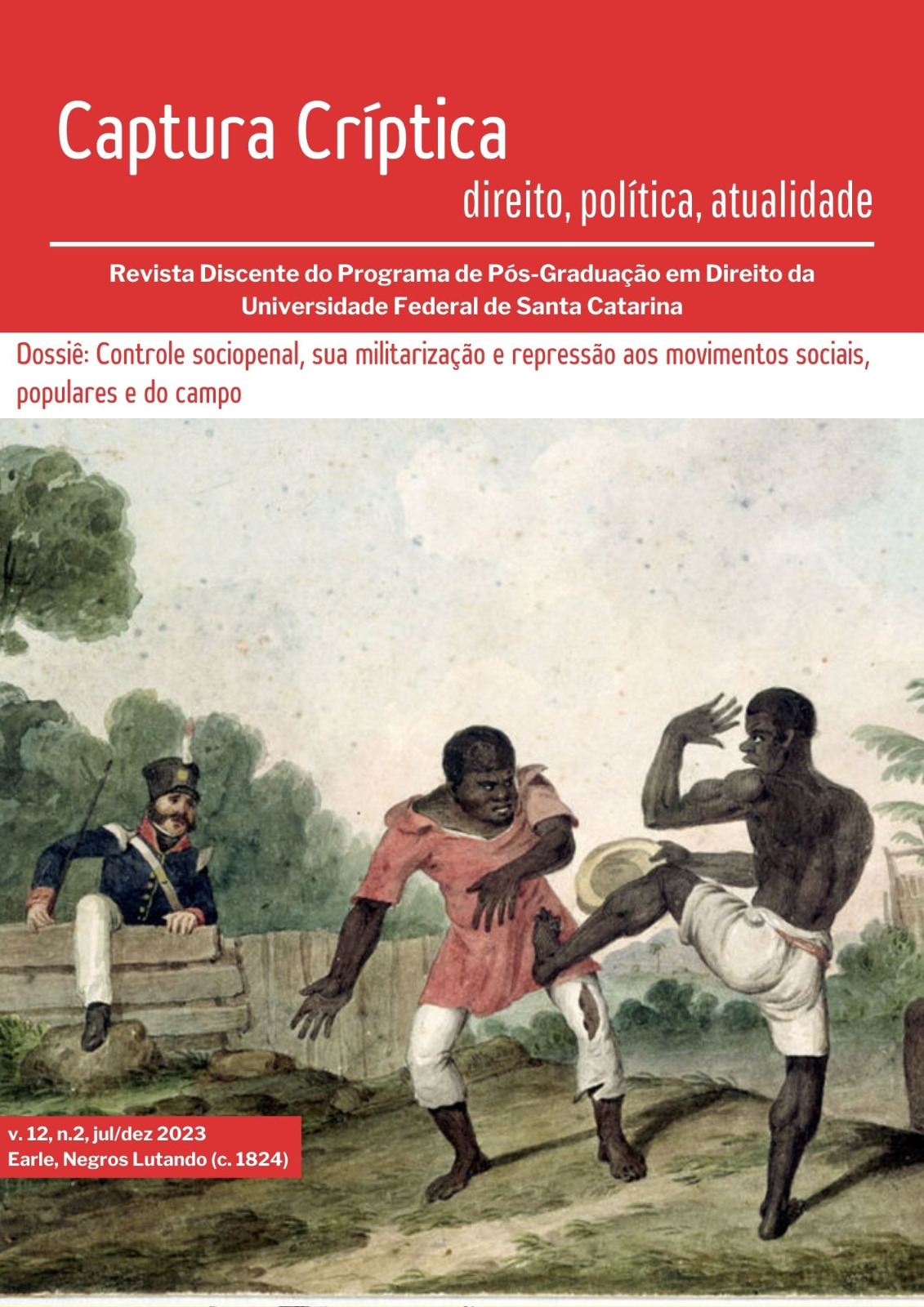Velhos elos esquecidos: o policiamento como fator de aumento do encarceramento
Palavras-chave:
Policiamento, Encarceramento, Punitividade, Interações, CriminologiaResumo
O fenômeno do hiperencarceramento é uma fonte de atenção para os pesquisadores da região, e os estudos que buscam entendê-lo estão aumentando, mas ainda temos muitas perguntas que não podemos responder. Uma delas, e a que quero abordar neste breve artigo, é: como o policiamento afeta a diminuição ou o aumento da taxa de encarceramento? Embora poucas tentativas tenham sido feitas para estabelecer uma ligação entre a polícia e seu trabalho diário e a prisão—há pesquisas que tentaram fazê-lo, portanto, no que se segue, pretendo apresentar algumas abordagens e declarações que se tornam importantes para começar a prestar atenção a essa linha de trabalho.
Referências
BECKETT, Katherine. Making Crime Pay: Law and Order in Contemporary American Politics. New York: Oxford University Press, 1997.
BRAGA, Anthony. Better Policing Can Improve Legitimacy and Reduce Mass Incarceration. Harvard Law Review, v. 129, n. 7, p. 233-241, 2016.
BREGMAN, Marcelo; FLOM, Hernán. Determinantes de la confianza en la policía: una comparación entre Argentina y México. Perfiles Latinoamericanos, n. 40, p. 97-122, 2012.
BRODEUR, Jean-Paul. Comparative penology in perspective. En: TONRY, Michael (ed.). Crime, punishment and politics in comparative perspective [Crime and Justice, 36]. Chicago: The University of Chicago Press, 2007. p. 49-91.
CALZADO, Mercedes; FERNÁNDEZ, Mariana; LIO, Vanesa. Seguridad, miedo y campañas políticas en la Ciudad de Buenos Aires. En: VII Seminario Internacional Políticas de la Memoria, 2014.
CAVADINO, Michael; DIGNAN, James. Penal Systems: A Compatarive Approach. London: Sage, 2006.
CHRISTIE, Nils. Los límites del dolor. México: FCE, 1988.
FEELEY, Malcolm; SIMON, Jonathan. Actuarial Justice: The Emerging New Criminal Law. En: NELKEN, David (ed.). The Futures of Criminology. London: Sage, 1994.
FEELEY, Malcolm; SIMON, Jonathan. La nueva penología: notas acerca de las estrategias emergentes en el sistema penal y sus implicaciones. Delito y Sociedad, n. 6–7, p. 33-58, 1995.
GARLAND, David. The Limits of the Sovereign State: Strategies of Crime Control in Contemporary Society. British Journal of Criminology, v. 36, n. 4, p. 445-471, 1996.
GARLAND, David. La cultura del control. Crimen y orden social en la sociedad contemporánea. Barcelona: Gedisa, 2005.
GARLAND, David. Punishment and Welfare: Social Problems and Social Structures. En: LIEBLING, Alison; MARUNA, Shadd; McAra, Lesley (eds.). The Oxford Handbook of Criminology. Oxford: Oxford University Press, 2017. p. 77-97.
GORDON, Diana. The topography of criminal justice: a factor analysis of the ‘get-tough’ policy trend. Criminal Justice Policy Review, v. 3, n. 2, p. 184-207, 1989.
GOTTSCHALK, Marie. Caught: The Prison State and the Lockdown of America. Princeton: Princeton University Press, 2015.
HAMILTON, Claire. Reconceptualizing Penality: Towards a Multidemensional Measure of Punitiveness. The British Journal of Criminology, v. 54, n. 2, p. 321-343, 2014.
HINDS, Lyn. Crime Control in Western Countries, 1970 to 2000. En: PRATT, John; BROWN, David; BROWN, Mark; HALLSWORTH, Simon; MORRISON, Wayne (eds.). The New Punitiveness: Trends, theories, perspectives. Devon: Willan Publishing, p. 47-65, 2005.
JACQUES, Scott; WRIGHT, Richard. Code of the Suburb: Inside the World of Young Middle-Class Drug Dealers. Chicago: The University of Chicago Press, 2015.
KESSLER, Gabriel. El sentimiento de inseguridad: sociología del temor al delito. Buenos Aires: Siglo XXI, 2011.
LACEY, Nicola. The Prisoners’ Dilemma: Political Economy and Punishment in Contemporary Democracies. Cambridge: Cambridge University Press, 2008.
LAPPI-SEPPÄLÄ, Tapio. Trust, Welfare, and Political Culture: Explaining Differences in National Penal Policies. Crime and Justice, v. 37, n. 1, p. 313-387, 2008.
LAPPI-SEPPÄLÄ, Tapio. American Exceptionalism in Comparative Perspective: Explaining Trends and Variation in the Use of Incarceration. En: REITZ, Kevin R. (ed.): American Exceptionalism in Crime and Punishment. Oxford: Oxford University Press, 2018. p. 195-271.
NEAPOLITAN, Jerome. An Examination of Cross-National Variation in Punitiveness. International Journal of Offender Therapy and Comparative Criminology, v. 45 n. 6, p. 691-710, 2001.
NEUSTETER, Rebecca; SUBRAMANIAN, Ram; TRONE, Jennifer; KHOGALI, Mawia; REED, Cindy. Gatekeepers: The Role of Police in Ending Mass Incarceration. Safety+Justice Challenge, Vera Institute of Justice, 2019.
PHELPS, Michelle; PAGER, Devah. Inequality and Punishment: A Turning Point for Mass Incarceration?. The ANNALS of the American Academy of Political and Social Science, v. 663, n. 1, p. 185-203, 2016.
ROLDÁN, Nahuel. Policiamiento urbano, género y raza: interacciones entre jóvenes y policías”. En: ALZUETA, Esteban Rodríguez (comp.): Yuta. El verdugueo policial desde la perspectiva juvenil. La Plara: Malisia, 2020. p. 69-116.
SIMON, Jonathan. Gobernar a través del delito. Barcelona: Gedisa, 2007.
SKOLNICK, Jerome. Justice Without Trial. En: WEISBURD, David; UCHIDA, Craig (eds.). Police Innovation and Control of the Police: Problems of Law, Order, and Community. New York: Springer-Verlag, 1993. p. 13-31.
SOZZO, Máximo. Postneoliberalismo y penalidad en América del Sur. A modo de introducción. En: SOZZO, Máximo (comp.). Postneoliberalismo y penalidad en América del Sur. CABA: CLACSO, 2016, 9-28.
SOZZO, Máximo. La inflación punitiva. Un análisis comparativo de las mutaciones del derecho penal en América Latina (1990-2015). CABA: Café de las Ciudades, 2017.
TONRY, Michael. Determinants of penal policies. En: TONRY, Michael (ed.). Crime, punishment and politics in comparative perspective [Crime and Justice, 36]. Chicago, The University of Chicago Press, 2007. p. 1-48.
WENZELBURGER, Georg. Political Economy or Political Systems? How Welfare Capitalism and Political Systems Affect Law and Order Policies in Twenty Western Industrialised Nations. Social Policy & Society, v. 17, n. 2, p. 209-226, 2018.
YOUNG, Kathryne; PETERSILIA, Joan. Keeping Track: Surveillance, Control, and the Expansion of Carceral State. Harvard Law Review, v. 129, n. 7, p. 1318-1360, 2016.
Downloads
Publicado
Edição
Seção
Licença
Copyright (c) 2023 Nahuel Roldán

Este trabalho está licenciado sob uma licença Creative Commons Attribution-NonCommercial-NoDerivatives 4.0 International License.
Os trabalhos publicados na Revista Captura Críptica estão sob a Licença Creative Commons Attribution-NonCommercial-NoDerivatives 4.0 International.










